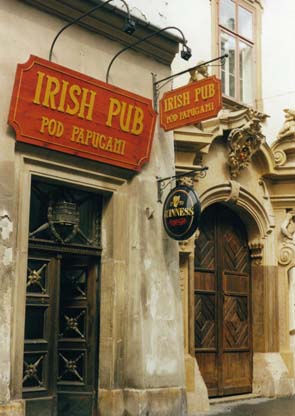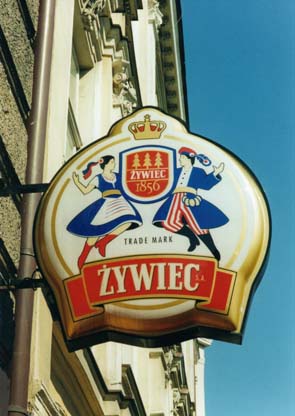| Return to main page |
As you walk around the city of Cracow, identify examples of the new private businesses whose owners might be considered nouveaux riches.What are the characteristics of such people and how do they relate to the things they own? Do you think they form a clear group in terms of their class position or consumption style? Do you see any signs of public antipathy toward such people? In what ways does their position depend on frameworks of law and security, which ultimately depend on the power of state?

Figure 25: An example of the new city centre entrepreneurialism
Tom and Ania discussed this assignment with Maria that evening. Maria had taken an introductory Marketing course in the previous semester and was happy to tell her friends all she knew about sectors and niches in Cracow. The new rich were far less conspicuous than in Warsaw, the capital, but even so they were visible. No, people in Cracow had little difficulty in coming to terms with widening social inequalities, although some of her teachers seemed to feel a strong resentment. One or two felt that traditional respect for the intelligentsia was sadly fading. Even the preeminent reputation of the Jagiellonian University, which had somehow survived the decades of communism, might now be vulnerable. The problem was especially obvious in subjects like economics and law. Under communism, good people were sometimes denied jobs for political reasons. Now the criteria were economic rather than political, and some of the best people were turning away from academic careers in order to make more money in the private sector. 'But isn't it just the same story in Britain and the States?' asked Maria.
Ania agreed that it probably was and changed the subject by asking about Maria's flat. It had been built in the usual manner in the 1970s as a cooperative, but following the collapse of communism the flats had become the private property of their occupiers. The owners of Maria's flat had completely redecorated it and every room had been given an American theme. The walls of Maria's room were covered with Disney cartoon characters and Tom was amused by the poster of downtown Chicago in the bathroom. Meanwhile, assisted by family, the owners had themselves moved to America. So they let the flat by means of a formal contract to Pan Y, who had in turn sub-let to Maria, without giving her any contract. Strictly speaking he was not entitled to do this, but who cared? The owners were only concerned to have their flat occupied and some rental income. Maria had in turn sub-let rights to Wlodek, whose presence was tolerated by Pan Y and unknown to the owners. 'Just imagine the complexity of ownership and use rights if you add all the flats and houses of this city together,' said Ania.
'Would London be any different?' countered Tom.
Maria pointed out that the old communist system, which was intended to allocate housing according to need, had in practice always been subverted by a criterion of 'ability to pay' and by blatant corruption. The privatisation policies had merely accentuated the power of the market principle over the principle of redistribution. Ania, whose parents owned a semi-detached house in Slough, wondered if somehow a positive sentiment of being an owner should also feature in the comparison.
'Don't people have a different feeling, now that they are owners, in the same way that former council-house owners in England have taken more pride in the presentation of their property and maintained it better when they became owners?'
Maria thought that this might apply more in smaller towns, but on large estates in large cities it was unrealistic to expect any significant change in people's attitudes. Many people felt more vulnerable now that they were owners and liable for the full economic costs of maintaining the fabric of the building, costs that might rise unpredictably and were outside their control.
Wlodek's only contribution to the conversation was to mention an association of which he had briefly been a member in his home town in the east. Its slogan was 'Poland for the Poles' and it had organised campaigns against the sale of Polish real estate to foreigners. Wlodek said he still sympathised with the aims of the association, for if the market were to be completely open then all the attractive parts of Poland would be snapped up by wealthy Germans. He had, however, resigned his membership when he discovered that most of the other members were extreme nationalists, who viewed all Poland's neighbours with contempt.
Tom proposed going out for a beer and they found an establishment that seemed to offer only Polish brands. Wlodek explained that, although the beer called Zywiec was brewed in a small Polish town in the hills to the south-west, the brewery was now owned by the Holland-based multinational Heinecken, which had recently revamped the entire production process. 'I suppose we should just be grateful that the traditional name has been kept. It's funny that, in the case of beer, that seems to make commercial sense for the new owners, whereas with many other products customers much prefer to have a foreign name.'
Ania had known the Zywiec trademark since childhood, since the beer was also popular in Polish restaurants in London. 'It's a good example of intellectual property,' she commented.

Figure 26: The Zywiec trademark
On their way back to the dormitory Tom remarked that, although external, statistical models of Poland's postcommunist economy presented a predominantly positive picture, the opinions of many Poles they talked to were much more negative. 'The local model portrays a society of losers, yet objectively speaking it's clear that most people have been winners.'
Ania replied: 'That's not so surprising, especially if more people now compare their living standards to those of the richest western countries. But I don't think it's possible to talk of a single'local model', when even Maria and Wlodek see their economic worlds very differently.'
| Return to main page |